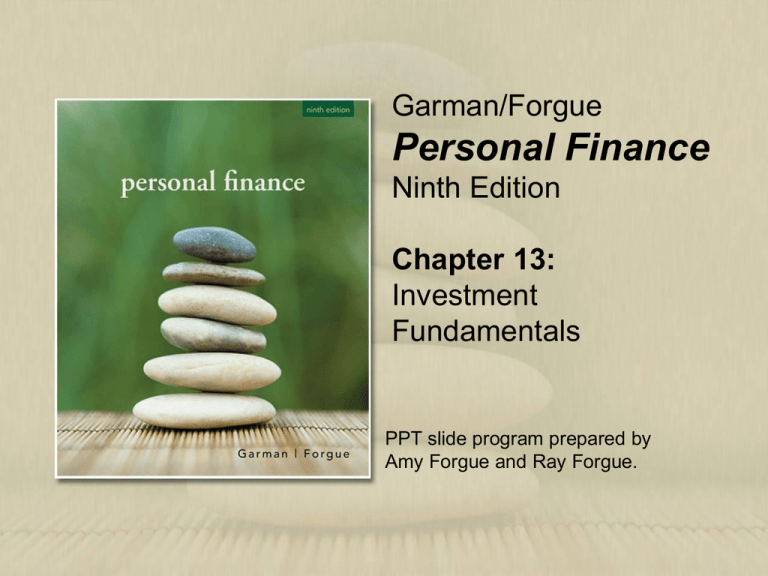
Garman/Forgue
Personal Finance
Ninth Edition
Chapter 13:
Investment
Fundamentals
PPT slide program prepared by
Amy Forgue and Ray Forgue.
Learning Objectives
1. Explain how to get started as an
investor.
2. Discover your own investment
philosophy.
3. Identify the kinds of investments that
match your interests.
Copyright ©Houghton Mifflin Company. All rights reserved.
13 - 2
Learning Objectives
4. Describe the major factors that affect
the rate of return on investments.
5. Decide which of the five long-term
investment strategies you will utilize.
6. Create your own investment plan.
Copyright ©Houghton Mifflin Company. All rights reserved.
13 - 3
Starting Your Investment Program
• Investing is more than saving.
– Savings
– Investing
– Securities
– Stocks
– Portfolio
• Are you ready to invest?
Copyright ©Houghton Mifflin Company. All rights reserved.
13 - 4
Starting Your Investment Program
• Decide why you want to invest.
• Where can you get the money to
invest?
Copyright ©Houghton Mifflin Company. All rights reserved.
13 - 5
Starting Your Investment Program
• What investment returns are possible?
– Financial (or Business) Risk
– Total Return
– Current Income
– Interest
– Rent
Copyright ©Houghton Mifflin Company. All rights reserved.
13 - 6
Starting Your Investment Program
• What investment returns are possible?
– Dividend
– Capital Gain
– Capital Loss
– Rate of Return (or Yield)
Copyright ©Houghton Mifflin Company. All rights reserved.
13 - 7
Your Investment Philosophy
• How to handle investment risk
– Pure risk
– Speculative risk
– Investment risk
Copyright ©Houghton Mifflin Company. All rights reserved.
13 - 8
What is your Investment Philosophy?
• Are you a conservative Investor?
– Preservation of capital
• Are you a moderate investor?
– Risk indifferent
• Are you an aggressive investor?
– Risk seeker
Copyright ©Houghton Mifflin Company. All rights reserved.
13 - 9
Your Investment Philosophy
• Should you take an active or passive
investing approach?
Copyright ©Houghton Mifflin Company. All rights reserved.
13 - 10
Identify the kinds of investments you
want to make.
• Do you want to lend or own?
– Lend = Bonds
– Debts
– Fixed maturity
– Fixed income
– Equities
• Choose investments for their components
of total return.
Copyright ©Houghton Mifflin Company. All rights reserved.
13 - 11
Random and Market Risk
• Random (or unsystematic) risk
• Diversification
• Systematic (or market or undiversifiable)
risk
Copyright ©Houghton Mifflin Company. All rights reserved.
13 - 12
Other Types of Investment Risks
• Business failure (or financial) fisk
• Inflation (or purchasing power) risk
• Time risk
• Business cycle risk
Copyright ©Houghton Mifflin Company. All rights reserved.
13 - 13
Other Types of Investment Risks
• Market-volatility risk
• Liquidity risk
• Reinvestment risk
• Marketability risk
Copyright ©Houghton Mifflin Company. All rights reserved.
13 - 14
Returns
• Transaction costs reduce returns
– Commissions
• Leverage may increase returns.
Copyright ©Houghton Mifflin Company. All rights reserved.
13 - 15
The Tax Consequences in Investment
Fundamentals
• After-Tax Return
• Income Versus Capital Gain
• Tax-Deferred Investments
• Tax-Exempt Income
• Tax-Exempt Investments
Copyright ©Houghton Mifflin Company. All rights reserved.
13 - 16
Establish Your Long-Term Investment
Strategy
• Real Rate of Return
• Securities Markets
• Bear Market
• Bull Market
Copyright ©Houghton Mifflin Company. All rights reserved.
13 - 17
Establish Your Long-Term Investment
Strategy
• Long-term investors understand market
timing.
– They are market timers.
• Calculate the real rate of return (after
taxes and inflation) on investments.
Copyright ©Houghton Mifflin Company. All rights reserved.
13 - 18
Establish Your Long-Term Investment
Strategy
• Strategy 1: Buy and hold anticipates
long-term economic growth.
– Buy-and-Hold (or Buy to Hold)
Copyright ©Houghton Mifflin Company. All rights reserved.
13 - 19
Establish Your Long-Term Investment
Strategy
• Strategy 2: Dollar-cost averaging buys
at “below-average” costs.
– Dollar-Cost Averaging (or Cost
Averaging)
– Below-Average Costs
• Dollar-cost averaging in a fluctuating
market
– Average Share Price
– Average Share Cost
Copyright ©Houghton Mifflin Company. All rights reserved.
13 - 20
Establish Your Long-Term Investment
Strategy
• Strategy 3: Portfolio diversification
reduces portfolio volatility.
• Strategy 4: Asset allocation keeps you
in the right investment categories at the
right time.
Copyright ©Houghton Mifflin Company. All rights reserved.
13 - 21
Establish Your Long-Term Investment
Strategy
•
Strategy 5: Modern portfolio theory
evolves from asset allocation
– Modern Portfolio Theory (or MPT)
– Monte Carlo Analysis
Copyright ©Houghton Mifflin Company. All rights reserved.
13 - 22
The Top 3 Financial Missteps In
Investing
People slip up in when they do the
following:
1. Invest only money that is left over at
the end of the month.
2. Follow a conservative investment
philosophy for long-term goals.
3. Fail to regularly rebalance the assets
in their portfolio.
Copyright ©Houghton Mifflin Company. All rights reserved.
13 - 23
Good Money Habits in Investing
Fundamentals
• Sacrifice some of your income by investing
for your future needs and lifestyle.
• Start early in life to invest in a diversified
portfolio of assets consistent with your
investment philosophy.
• When investing for the long term, willingly
accept more risk.
Copyright ©Houghton Mifflin Company. All rights reserved.
13 - 24
Good Money Habits in Investing
Fundamentals
• Invest regularly through your
employer’s retirement plan using an
asset allocation strategy.
• Invest no more than 10 percent of your
portfolio in your company stock, or any
single company stock, for that matter.
Copyright ©Houghton Mifflin Company. All rights reserved.
13 - 25
Good Money Habits in Investing
Fundamentals
• Follow the buy-and-hold long-term
approach to investing.
• Invest in stocks, mutual funds, bonds,
and real estate, not life insurance or
annuities.
Copyright ©Houghton Mifflin Company. All rights reserved.
13 - 26








